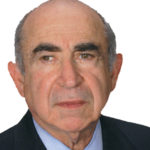2009 Honoree International DI Society
W. Harold Petersen Lifetime Achievement Award
2015 Honoree of NAILBA’s
Douglas Mooers Award for Excellence
With the help of Victor Cohen, this is part of our ongoing series with Eugene Cohen, founder of the Eugene Cohen Insurance Agency, Inc 2009 Honoree International DI Society W. Harold Petersen Lifetime Achievement Award, 2015 Honoree of NAILBA’s Douglas Mooer Award for Excellence.
From time to time, we will feature an interview with Eugene, who has dedicated over 60 years of his life to learning, teaching, and supporting brokers in the agency’s quest to help consumers protect their incomes from the tragic effects of a disability.
Disability insurance (DI) is one of those products that can change the trajectory of an individual and a family’s life and is crucial for every financial planner and insurance professional to learn about and offer to clients.
Victor: Great talking about individual disability insurance (DI) with you again, Eugene. Very appreciated.
Eugene: Thank you, Victor. I always look forward to our conversations.
Victor: As do I. And our discussion today is especially timely.
Eugene: That’s right. Because May is Disability Insurance Awareness Month. Really, every month of the year—not just in May—producers need to be aware of the important role disability insurance plays in protecting a client’s most valuable asset—their ability to earn an income.
Victor: So, I know this is a big question. But let’s just dive in! What do producers need to be aware of when it comes to disability insurance?
Eugene: Well, first of all, just like one shoe doesn’t fit every foot, the same can be said perhaps about disability insurance companies. It really helps if producers are aware of this.
For example, some DI companies have products designed to be most attractive to the white-collar market. Doctors, lawyers, accountants, engineers, etc.
Other DI companies may seek out individuals who have more blue/grey collar type occupations. These are those occupations that involve a lot of manual duties—electricians, plumbers, carpenters, hair stylists, machinists, mechanics, truck drivers, etc.
It’s the advisor’s responsibility to know which DI companies may serve their DI clients’ needs best.
Victor: How would a producer who is new or does very little DI business know what DI company or companies may best serve their client’s occupation type?
Eugene: The more an advisor becomes familiar with the different DI products out there, the more evident it becomes. Working with an MGA, similar to our agency, can often be an excellent resource.
Victor: What else do producers need to be aware of regarding DI insurance?
Eugene: The producer needs to be aware that when a high-earning professional client has group long term disability (LTD) insurance through their employer—that client may often have an important need to add an individual disability insurance policy on top of that group LTD.
Victor: I have often heard you say, group LTD is a great start. But it often isn’t enough.
Eugene: That’s right. You will find that high income executives and professionals like doctors, attorneys, engineers, etc., may have group long term disability insurance. But the group LTD typically often only covers a portion of the client’s annual income.
For example, an executive earning $300,000 per year, which is $25,000 per month, may think they are adequately covered by just their employer paid group LTD.
But let’s say the client’s group LTD policy pays perhaps a monthly benefit of 60 percent of the client’s monthly income, up to a maximum monthly cap of $10,000. And in this example, premiums are being paid by the employer with no gross-up, which means the benefits may be taxable at time of claim.
For this client, their after-tax net monthly benefit could perhaps be much lower than the $10,000 they were expecting. It’s possible for a client’s joint tax backet, plus possible state taxes, to be well over 30 to 40 percent. If the producer made the client aware of their group LTD shortcoming, the client would most likely need to add coverage with an individual disability insurance policy. Of course they would need to qualify for the additional coverage, based on health history and the issue and participation limits of the individual disability insurance companies being considered.
Victor: What else is important for a producer to be aware of when it comes to DI?
Eugene: Usually, if you have three clients working for the same employer, the clients may qualify for a “multi-life” discount if they all apply for DI and take their policies.
Something else to be aware of—many DI companies have “simplified underwriting” where labs and an exam may not be required in underwriting—based on the client’s age at application time and the monthly benefit amount they are applying for.
Here’s something else to be aware of—business owners are fantastic DI clients. Many DI companies offer incentives to business owners with discounts typically ranging from 10 to 15 percent, depending on the DI company.
And there are excellent DI products specifically for business owners. Like business overhead expense protection. If the owner has a qualified disability, the policy pays eligible qualified business expenses like the monthly lease, perhaps employee salaries and other monthly business expenses. Typically, this is an expense reimbursement policy.
Talking about business owners, if the advisor has two or more clients who are business owners of the same company, those clients may already have a buy-sell agreement funded with life insurance. The advisor needs to be aware that there is also a disability buyout policy that can fund a buy-sell agreement if an owner is totally disabled and unable to work.
Victor: There is also a lot to be aware of when a producer has a physician client, correct?
Eugene: Definitely. Producers should be aware that the medical resident and medical fellow market is very competitive. Many companies offer comprehensive DI policies with substantial discounts to these clients.
There are options on the policies to increase coverage at a later date with no medical underwriting, just financial underwriting only. This is great after the client finishes their medical training and starts their first job where their income can rapidly increase.
Victor: Speaking a little more about doctors, what should producers and their physician clients be aware of when it comes to “medical specialty language” in a DI policy?
Eugene: A producer with a physician client who is a surgeon, a dermatologist, or really a doctor with any medical specialty, producers need to be aware that there are some DI companies that offer policies that have “medical specialty language.”
If totally disabled, this important language may provide more flexibility for the physician client if they can’t perform the duties of that specialty, but can still work in a different career or different field of medicine.
For example, take an orthopedic surgeon who gets in a skiing accident and permanently injures their left hand, making them unable to go back to work as a surgeon because they can no longer perform surgery.
Thanks to “medical specialty language” in a DI policy, perhaps that surgeon decides to work in a different medical specialty that does not require use of both hands. They could earn income from that new medical occupation while still collecting their full disability benefit—because they are disabled and unable to work (per the policy’s definition of total disability) in their medical specialty. Of course, each claim can have its own set of circumstances and would need to be approved by the insurance company paying the claim.
Victor: Thank you, Eugene, for another great DI conversation. Do you have any final thoughts as we wrap up this discussion?
Eugene: It’s obviously better for your client to be aware of income protection insurance before becoming disabled rather than after.
Imagine your client’s spouse calls and says, “My partner has had a stroke and will be permanently disabled for an indefinite amount of time. I know there is some kind of policy that pays. Do we have that?”
The conversation will continue one of the following three ways, with you, the advisor, replying:
Response number one: “We never talked about it. They do not have that type of policy.”
Response number two: “Your partner and I went over that DI product thoroughly and they signed a form I have in my files confirming that they did not want it.”
Response number three: “Your partner has a DI policy. The policy is active. Let’s see if they have a qualifying claim.”





























